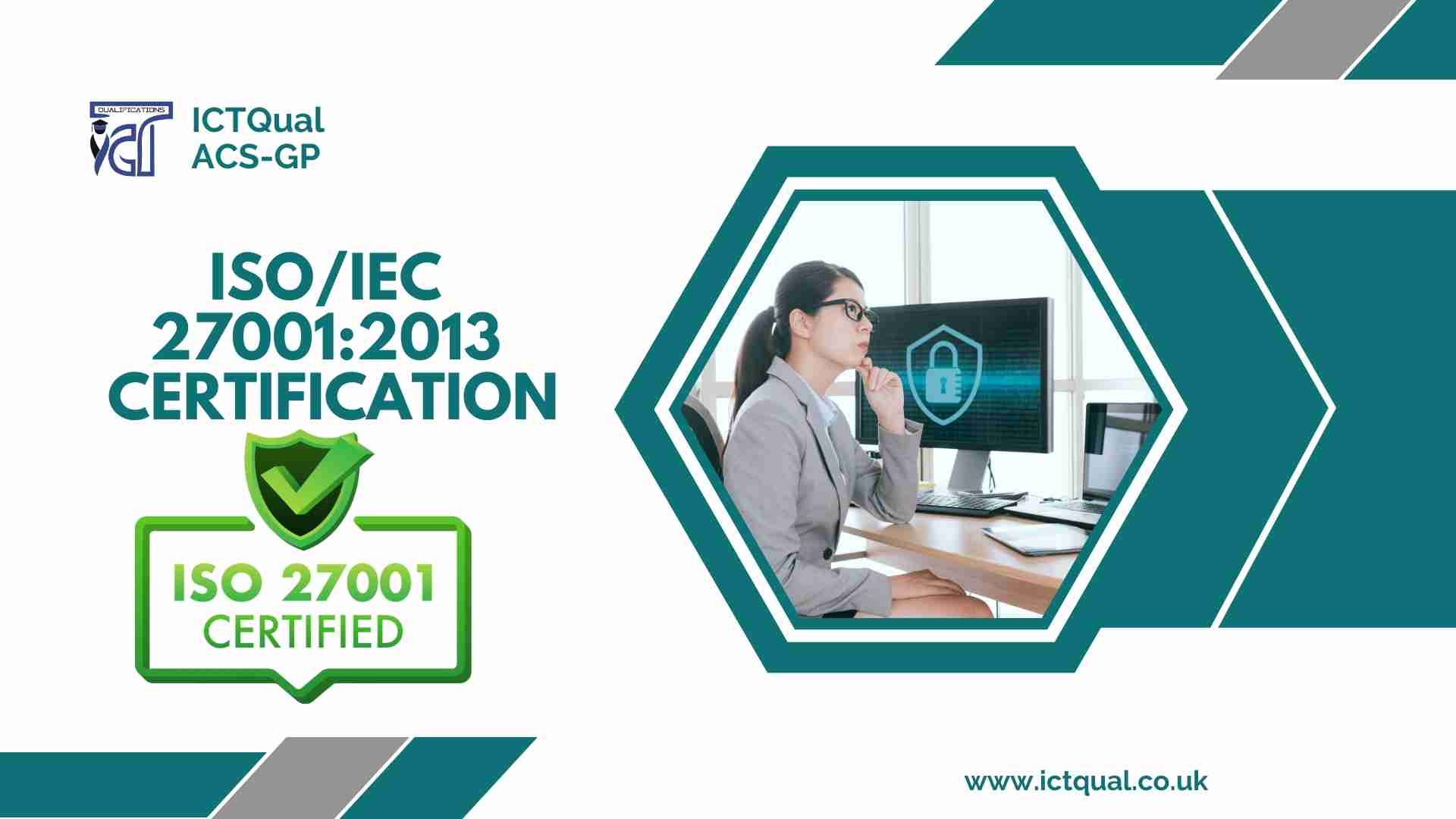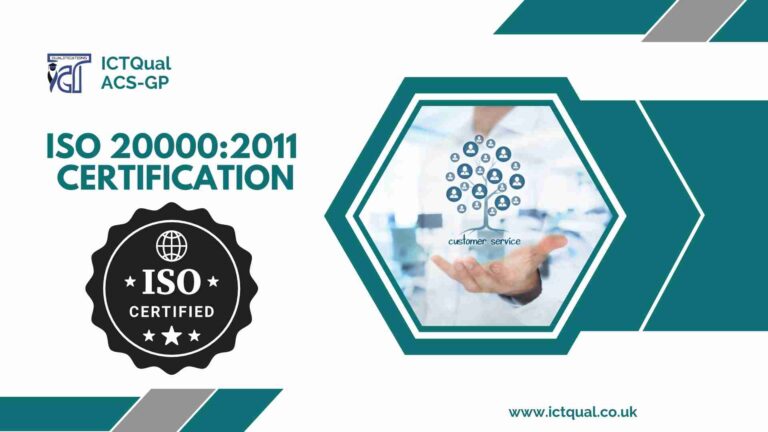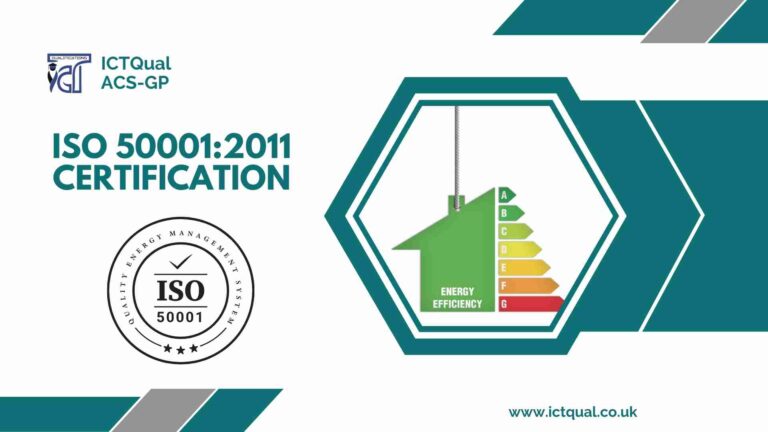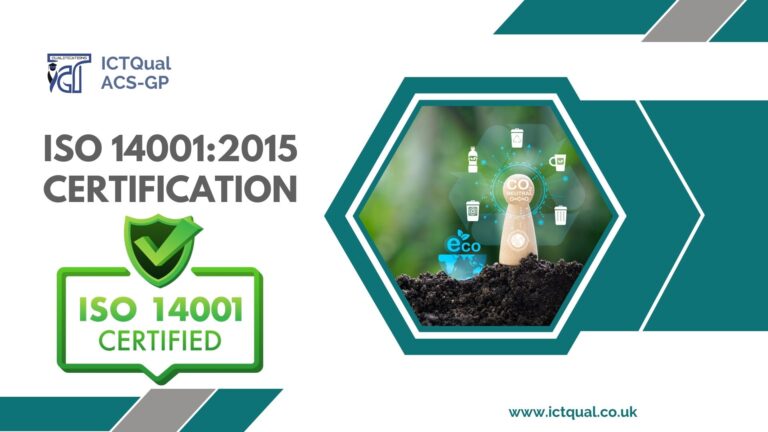Attention all business owners! Want to protect your company’s information assets and enhance your reputation? Look no further than ISO/IEC 27001:2013 certification! This internationally recognized certification demonstrates your commitment to information security and helps you mitigate risks, comply with legal requirements, and gain a competitive edge. Plus, it’s a valuable investment in the digital age where cyber threats are constantly evolving. Don’t wait, take the first step towards securing your company’s future with ISO/IEC 27001:2013 certification today!
ICTQual is Exclusive partner of ACS-GP and providing services for company registration with ISO in following ISO Standards
ISO/IEC 27001:2013 Certification
In today’s digital age, information is one of the most valuable assets for any organization. From customer data to financial records, sensitive information is constantly being generated and shared across various platforms. This makes it crucial for companies to establish and maintain effective information security management systems (ISMS) to protect against data breaches, cyberattacks, and other threats.
One way for companies to demonstrate their commitment to information security is by obtaining ISO/IEC 27001:2013 certification. This certification is recognized worldwide as a mark of excellence in information security management and can provide numerous benefits for companies seeking to enhance their reputation and improve customer confidence. Let’s dive into the world of ISO/IEC 27001:2013 certification and explore how it can help your company protect its valuable information assets.
Importance of ISO/IEC 27001:2013 Certification for Company
ISO/IEC 27001:2013 certification is becoming increasingly important for companies seeking to register and operate in today’s digital world. The certification demonstrates that a company has implemented a comprehensive information security management system (ISMS) that meets international standards, providing assurance to stakeholders that their information is being protected.
ISO/IEC 27001:2013 is a globally recognized standard that sets out the requirements for implementing an ISMS that addresses the confidentiality, integrity, and availability of an organization’s information assets. Compliance with the standard requires a systematic and proactive approach to identifying and managing information security risks.
Obtaining ISO/IEC 27001:2013 certification can provide several benefits for a company seeking registration. It can enhance the company’s reputation by demonstrating its commitment to information security, which can be especially important in industries where security breaches could have severe consequences for the company and its customers. Certification can also help the company comply with legal and regulatory requirements related to data protection and privacy.
Moreover, obtaining certification can improve the company’s ability to win new business and retain existing customers. Customers are increasingly demanding that their service providers have adequate measures in place to protect their data, and ISO/IEC 27001:2013 certification is an effective way to demonstrate this to customers.
In conclusion, ISO/IEC 27001:2013 certification is important for companies seeking registration in today’s digital world. The certification can help a company establish a robust information security management system, improve its reputation, comply with legal and regulatory requirements, and win and retain customers.
Benefits of Obtaining ISO/IEC 27001:2013 Certification
Obtaining ISO/IEC 27001:2013 certification for your company can bring a range of benefits to your organization. In this article, we will discuss some of the key advantages of achieving this certification for information security management.
Enhanced Information Security
ISO/IEC 27001:2013 certification demonstrates that your company has implemented and maintains an effective information security management system (ISMS). This means that your organization has taken a comprehensive approach to identifying and managing information security risks, ensuring the confidentiality, integrity, and availability of information assets.
Increased Customer Confidence
By obtaining certification, you can reassure your customers that their sensitive information is being protected by a robust and reliable ISMS. This can help to build trust and confidence in your brand, leading to increased customer loyalty and repeat business.
Compliance with Legal and Regulatory Requirements
Many industries and jurisdictions have specific regulations and legal requirements regarding information security. By achieving ISO/IEC 27001:2013 certification, your company can demonstrate compliance with these requirements and avoid potential penalties or legal issues.
Competitive Advantage
ISO/IEC 27001:2013 certification can give your company a competitive advantage over other organizations that do not have this certification. It can also help to differentiate your company from competitors and demonstrate your commitment to best practices in information security management.
Continuous Improvement
The certification process involves ongoing monitoring and improvement of your ISMS. This can lead to a culture of continuous improvement within your organization, resulting in better overall business practices and increased efficiency.
In conclusion, obtaining ISO/IEC 27001:2013 certification for your company can bring many benefits, including enhanced information security, increased customer confidence, compliance with legal and regulatory requirements, competitive advantage, and a culture of continuous improvement.
Achieving ISO/IEC 27001:2013 Certification for Information Security
Achieving ISO/IEC 27001:2013 certification for information security is a significant milestone for any company. The certification demonstrates that the company has implemented an effective information security management system (ISMS) that meets the requirements of the international standard. Here are the steps to follow to achieve the certification:
Define the scope
The first step is to determine the scope of the ISMS, which should cover all the company’s information assets, including people, processes, and technology. This will help identify the risks and vulnerabilities that need to be addressed.
Conduct a risk assessment:
The next step is to conduct a risk assessment to identify and prioritize the risks that need to be managed. This should be done using a formal risk assessment methodology, and the results should be documented.
Develop a risk treatment plan
Based on the results of the risk assessment, a risk treatment plan should be developed that identifies the controls that will be implemented to manage the identified risks. The controls should be based on the Annex A controls of the standard.
Implement the controls
Once the risk treatment plan has been developed, the controls should be implemented. This may involve changes to the company’s policies, procedures, and technology.
Monitor and review
The controls should be monitored and reviewed regularly to ensure they are effective and that any issues are addressed. The results of the monitoring and review should be documented.
Conduct an internal audit
An internal audit should be conducted to ensure that the ISMS is being implemented effectively and that the controls are working as intended.
Obtain certification
Finally, the company should engage an accredited certification body to conduct an independent audit of the ISMS. If the audit is successful, the company will be awarded ISO/IEC 27001:2013 certification.
By following these steps, companies can achieve ISO/IEC 27001:2013 certification for information security, which will help them demonstrate their commitment to information security and improve their reputation with customers and partners.
How ISO/IEC 27001:2013 Certification Can Improve Your Company’s Reputation
In today’s digital age, protecting sensitive information and data has become a critical concern for companies of all sizes and industries. Cybersecurity threats are on the rise, and customers are increasingly wary of sharing their personal information with organizations that do not prioritize information security. One way for companies to demonstrate their commitment to information security is by obtaining ISO/IEC 27001:2013 certification.
ISO/IEC 27001:2013 is an internationally recognized standard for information security management systems (ISMS). Obtaining the certification demonstrates that a company has implemented a comprehensive ISMS that meets the rigorous requirements of the standard. This includes identifying and managing information security risks, establishing and maintaining secure systems and processes, and regularly monitoring and reviewing security practices to ensure continuous improvement.
Achieving ISO/IEC 27001:2013 certification can have a positive impact on a company’s reputation. Customers and stakeholders can feel more confident in the company’s ability to protect their sensitive information and data. It can also set a company apart from competitors who have not obtained the certification, potentially giving the certified company a competitive edge in the marketplace.
In addition to improving reputation, ISO/IEC 27001:2013 certification can also lead to other benefits for the company, such as improved efficiency and reduced costs associated with managing information security risks. It can also help companies comply with legal and regulatory requirements related to information security.
In today’s digital landscape, information security is more important than ever. By obtaining ISO/IEC 27001:2013 certification, companies can demonstrate their commitment to protecting sensitive information and data, improve their reputation, and potentially gain a competitive advantage in the marketplace.
Why Information Security Should be a Top Priority for Companies Seeking Certification
In today’s digital age, information is a valuable asset that is constantly at risk of being compromised by cyber threats. This is why information security should be a top priority for companies seeking certification, especially ISO/IEC 27001:2013 certification.
ISO/IEC 27001:2013 is an internationally recognized standard that provides a framework for establishing, implementing, maintaining, and continually improving an information security management system (ISMS). This standard ensures that the confidentiality, integrity, and availability of information assets are protected, and risks are identified, managed, and mitigated.
Obtaining ISO/IEC 27001:2013 certification demonstrates to customers, partners, and stakeholders that a company is committed to information security and has taken measures to protect their information. It also ensures that the company complies with legal and regulatory requirements, which can mitigate the risk of legal and financial penalties.
Moreover, achieving ISO/IEC 27001:2013 certification requires a company to conduct a thorough risk assessment and implement appropriate controls to mitigate identified risks. This process not only enhances information security but also helps companies identify and address potential weaknesses in their operations and processes.
In conclusion, information security should be a top priority for companies seeking certification, and ISO/IEC 27001:2013 provides a comprehensive framework to achieve this. Obtaining certification can enhance a company’s reputation, protect its information assets, and ensure compliance with legal and regulatory requirements.
Conclusion
ISO/IEC 27001:2013 certification is an important achievement for any company looking to establish a robust information security management system. The certification demonstrates a company’s commitment to protecting its information assets, as well as its customers’ information, against cyber threats and data breaches.
The process of achieving certification involves conducting a comprehensive risk assessment and implementing appropriate controls to mitigate identified risks. This process not only enhances information security but also helps companies identify and address potential weaknesses in their operations and processes.
Obtaining ISO/IEC 27001:2013 certification can provide numerous benefits to a company, such as improving its reputation, enhancing customer confidence, complying with legal and regulatory requirements, and reducing the risk of security breaches and data losses. It can also help companies gain a competitive edge in the market by demonstrating their commitment to information security.
In today’s digital age, where cyber threats are constantly evolving, it is crucial for companies to prioritize information security. ISO/IEC 27001:2013 certification provides a comprehensive framework to achieve this and is a valuable investment for any company that values the security of its information assets.







